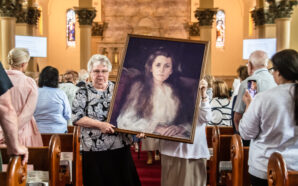October 15-27 is National Anti-Poverty Weeks
This year the Anti-Poverty Week have come close to home. The cost of living has risen sharply as food, power, petrol, rental accommodation, and mortgages have all risen in price and more people have struggled to pay debts. A sudden illness can make the difference between struggle and homelessness. The gap between those with property and those renting, and between the very wealthy and those struggling to live have become more evident and scandalous. As anxiety has risen, so has the temper of public conversation about the Indigenous Voice to Parliament and other issues become more ill-tempered. Compassion for people who are doing it hard does not flow as freely as before.
In the coming year, poverty will not be something out there, but something that we will brush up against in our families and in our local streets. It will be reflected in boarded-up shops and in real estate signs for houses where people could not meet their mortgage payments. It will not be simply a social problem affecting strangers, but will wear the faces of people whom we know and have met or whom we see and hear through the media. Poverty may wear the faces of ourselves and of our children.
As we reflect on the human cost of poverty we are reminded that the flourishing of Australia and of other nations is not measured by statistics to do with national wealth but by enlarged possibilities for all persons, including those who are disadvantaged. To flourish is to live in security, to be housed, to have access to medical care, to education and employment, to build new relationships, to join community groups, and to develop our talents. Poverty is about the loss of possibility. We struggle to feed our families; we scrimp on health care; we move from place to place with the result that our children find it hard to learn and to make friends; any work we have is insecure; lose friends and have only temporary acquaintances. We lose connections and our nation loses its true wealth.
The face of poverty is often that of vulnerable young people. In their childhood, many have been deprived. Their education has suffered through the isolation of COVID and they may also have suffered from mental or physical illness. They will be fortunate if they can find encouragement in the face of the person who stops to talk, who is interested in their lives, who can put them in touch with kind and generous people and with agencies they may not have known about, and who care for them as persons. That interest and affection are so often the first step to finding new possibilities and making new connections. It is an invitation to us.
The face of poverty is also a public face. Societies, like individuals, must choose between focusing on their selfish interests or on those of all of society, especially the most vulnerable. The attitude of government to the poor is spelled out in the choices embedded in its policies: whether to give priority to private over public housing, whether to set its welfare payments above or below the poverty line, whether to establish a progressive or a flat taxation system, and so on. The prevailing economic ideology has privileged individual choice over social responsibility.
In difficult times it is always easy to put off decisions that carry risk. In domestic affairs, to do this is usually a mistake. That is true also of governments. Both to respond to poverty and build a just society demands and ultimately rewards courage.
Fr Andrew Hamilton SJ writes for Jesuit Communications and Jesuit Social Services.








